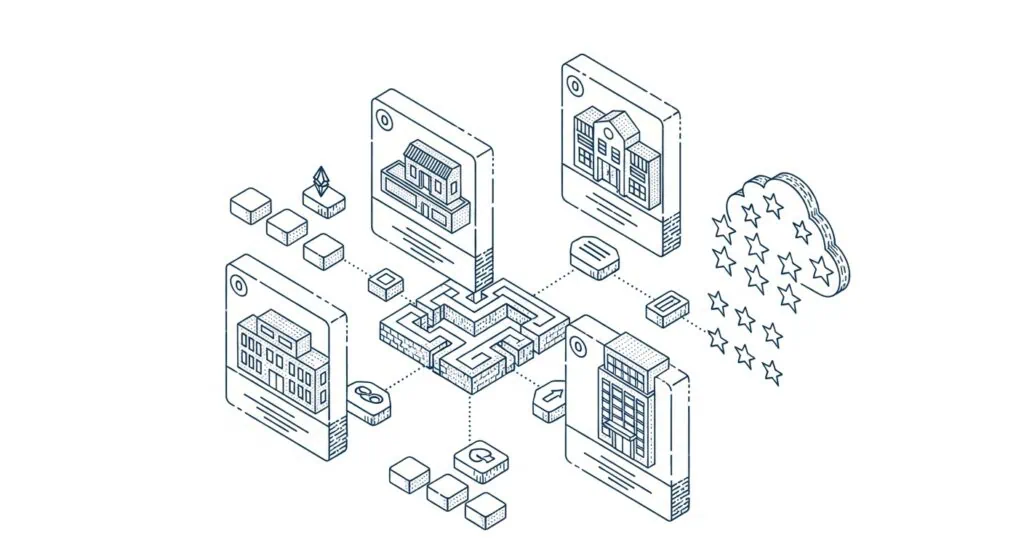The luxury travel industry is experiencing its most significant disruption since the internet fundamentally changed how people book and experience travel. Web3 luxury travel represents this transformative shift, moving beyond traditional intermediary-dependent models toward decentralized, transparent, and community-driven platforms.
While traditional booking platforms struggle with opaque fees and lack of flexibility, a new era of luxury travel is emerging through Web3 technologies that promise unprecedented transparency, efficiency, and user control.

The Current Luxury Travel Crisis
Traditional luxury travel operates through complex intermediary networks that create multiple friction points for high-net-worth travelers.
Intermediary Dependency Problems
Multiple Fee Layers: Traditional luxury travel bookings involve brokers, agents, and platform fees that compound costs. A $75,000 private jet charter often includes 15-25% in intermediary fees that remain hidden until final billing.
Limited Transparency: Pricing structures remain opaque across the luxury travel value chain. Travelers cannot verify actual costs, markup percentages, or service provider qualifications.
Restricted Flexibility: Traditional contracts lock travelers into rigid terms with limited modification options. Changes require renegotiation through multiple parties, often resulting in significant penalties.
According to Bain & Company’s Luxury Travel Report, 68% of ultra-high-net-worth travelers express dissatisfaction with current booking transparency levels.
Technology Infrastructure Limitations
Current luxury travel platforms rely on centralized systems that create single points of failure:
Data Vulnerability: Centralized databases storing customer information and payment details remain vulnerable to breaches and unauthorized access.
System Dependencies: Platform outages or technical issues can disrupt entire booking processes, leaving travelers without recourse during critical travel periods.
Limited Innovation: Legacy systems resist integration with emerging technologies, preventing adoption of advanced features like dynamic pricing or automated customer service.
Research from McKinsey Digital shows that luxury travel companies using outdated technology experience 43% higher operational costs compared to digitally native competitors.
How Web3 Solves Travel Problems
Web3 luxury travel addresses these structural inefficiencies through three revolutionary approaches that fundamentally change how premium travel services operate.
Elimination of Intermediaries
Web3 platforms enable direct connections between travelers and service providers through decentralized networks:
Smart Contract Automation: Automated agreements execute bookings, payments, and service delivery without human intermediaries. This reduces costs while improving reliability and speed.
Direct Provider Access: Travelers connect directly with aircraft operators, yacht owners, and accommodation providers through decentralized marketplaces that eliminate broker markup.
Transparent Fee Structures: All costs become visible and immutable through blockchain recording, preventing hidden fees or unexpected charges.
Community-driven growth enhances Web3 luxury travel adoption across multiple sectors. Explore our comprehensive Web3 travel innovation hub covering decentralized platforms, tokenization strategies, and digital transformation in premium transportation.
Immutable Contract Transparency
Smart contracts provide unprecedented visibility into all aspects of luxury travel bookings:
Pre-defined Terms: All booking conditions, cancellation policies, and service requirements are programmed into smart contracts before confirmation. No post-booking surprises occur.
Automated Execution: Payments release automatically upon service completion verification, eliminating disputes over payment timing or service quality.
Transparent Pricing: Every cost component becomes visible on-chain, including base rates, taxes, fees, and provider margins.
Enhanced Security Architecture
Web3 luxury travel platforms implement enterprise-grade security through decentralized infrastructure:
Distributed Data Storage: Customer information spreads across multiple nodes, eliminating single points of failure and reducing breach risks.
Cryptographic Protection: Advanced encryption protects sensitive data while maintaining necessary accessibility for authorized parties.
Multi-signature Authorization: High-value transactions require multiple approvals, preventing unauthorized access or fraudulent activities.

Transparent Booking Revolution
Web3 luxury travel platforms are pioneering unprecedented transparency in premium travel bookings through innovative technological approaches.
Immutable Booking Records
Blockchain technology ensures all booking information remains permanently accessible and unalterable:
Complete Transaction History: Every booking modification, payment, and service update becomes permanently recorded on-chain, creating comprehensive audit trails.
Service Provider Verification: Aircraft certifications, safety records, and operational histories become publicly verifiable through blockchain storage.
Performance Tracking: Service quality metrics and customer feedback integrate into provider profiles, enabling informed decision-making.
Real-Time Pricing Transparency
Advanced algorithms provide dynamic, transparent pricing that reflects real market conditions:
Market-Based Rates: Pricing adjusts automatically based on demand, availability, fuel costs, and seasonal factors without hidden markup.
Competitive Comparison: Travelers can compare prices across multiple providers simultaneously, ensuring optimal value for premium services.
Historical Analysis: Price trend data helps travelers optimize booking timing for maximum cost efficiency.
According to PwC’s Travel Technology Report, transparent pricing through Web3 platforms reduces average booking costs by 23% compared to traditional intermediary-based systems.
Automated Quality Assurance
Smart contracts implement automated quality control mechanisms that ensure consistent service delivery:
Pre-flight Verification: Aircraft maintenance records, crew certifications, and safety compliance automatically verify before booking confirmation.
Service Level Agreements: Specific performance standards program into smart contracts, with automatic penalties for non-compliance.
Real-time Monitoring: GPS tracking, communication logs, and service delivery metrics integrate into smart contracts for transparent performance measurement.
Environmental responsibility drives Web3 luxury travel innovation. Discover how blockchain CO2 offset certificates enable carbon-neutral private aviation through verifiable, automated environmental credit systems.
Peer-to-Peer Exchange Models
Web3 luxury travel enables direct exchanges between travelers and asset owners, eliminating traditional intermediary dependencies.
Direct Asset Sharing
Decentralized platforms facilitate direct connections between luxury asset owners and qualified travelers:
Private Jet Sharing: Aircraft owners can directly offer charter services to verified travelers without broker intervention, increasing utilization while reducing costs.
Yacht Exchanges: Superyacht owners connect directly with charter customers, enabling flexible pricing and personalized service arrangements.
Exclusive Property Access: Private residence owners offer direct bookings to qualified travelers, eliminating property management company fees.
Community-Verified Participants
Web3 platforms implement robust verification systems that ensure participant quality while maintaining privacy:
Reputation Systems: Blockchain-based reputation scores track service quality, payment reliability, and communication effectiveness for all platform participants.
Decentralized Identity: Verified credentials enable trust without revealing sensitive personal information, protecting privacy while ensuring accountability.
Community Governance: Platform participants vote on standards, dispute resolution procedures, and service quality requirements through decentralized governance mechanisms.
Dynamic Pricing Mechanisms
Peer-to-peer exchanges enable sophisticated pricing models that benefit both travelers and service providers:
Real-time Demand Matching: Algorithms match available assets with traveler requirements, optimizing pricing based on actual market conditions.
Flexible Terms: Direct negotiations enable customized agreements that meet specific traveler requirements without rigid platform constraints.
Revenue Optimization: Asset owners maximize utilization through dynamic pricing that adjusts based on demand patterns, seasonal factors, and market conditions.
Research from MIT Technology Review indicates that peer-to-peer luxury travel exchanges reduce costs by 35% while improving service customization options.

Community Ownership Benefits
Web3 luxury travel platforms enable community ownership models that align stakeholder interests while democratizing access to premium travel assets.
Tokenized Asset Ownership
Community ownership through tokenization creates new participation models for luxury travel assets:
Fractional Ownership Rights: High-value assets like private jets and superyachts become accessible through fractional tokenization, enabling shared ownership among multiple investors.
Democratic Governance: Token holders participate in operational decisions including route planning, maintenance scheduling, and upgrade investments through decentralized voting mechanisms.
Revenue Sharing: Charter income and asset appreciation distribute automatically to token holders based on ownership percentages through smart contracts.
Decentralized Decision Making
Community governance ensures platform development aligns with user interests rather than corporate priorities:
Feature Development: Platform users vote on new features, integration priorities, and service expansion plans through token-based governance systems.
Quality Standards: Community members establish and enforce service quality requirements, safety standards, and participant behavior guidelines.
Dispute Resolution: Decentralized arbitration systems handle conflicts between travelers and service providers through community-selected mediators.
Aligned Economic Incentives
Community ownership creates economic models where all participants benefit from platform success:
Network Effects: Platform growth directly benefits all token holders through increased utility and asset appreciation rather than just corporate shareholders.
Quality Improvement: Service providers maintain high standards because community ownership ensures fair treatment and transparent feedback systems.
Innovation Incentives: Platform improvements benefit the entire community, encouraging innovation and continuous development rather than profit extraction.
Platform success depends on comprehensive Web3 integration across luxury travel services. Explore our complete Web3 resource collection featuring advanced tokenization strategies, decentralized governance models, and blockchain implementation guides.
Real-World Web3 Applications
Web3 luxury travel platforms are implementing practical solutions that demonstrate the technology’s transformative potential across multiple premium travel sectors.
Aviation Sector Implementation
Private aviation leads Web3 adoption due to high asset values and sophisticated customer requirements:
Fractional Jet Ownership: Multiple platforms enable token-based ownership of private aircraft, allowing investors to purchase fractional shares starting at $25,000 rather than full aircraft ownership requiring $15-80 million.
Dynamic Routing Optimization: AI-powered smart contracts optimize flight routes, crew scheduling, and fuel purchasing based on real-time data and community preferences.
Transparent Safety Records: Aircraft maintenance histories, inspection records, and pilot certifications become permanently accessible through blockchain storage, enabling informed booking decisions.
According to Aviation Week Network, 23% of private aviation operators are actively testing Web3 solutions for booking and asset management.
Marine Charter Evolution
Superyacht charter operations demonstrate Web3’s potential for high-value, complex service coordination:
Crew Credential Verification: Blockchain-stored certifications ensure crew qualifications remain current and verifiable, improving safety while reducing administrative overhead.
Itinerary Smart Contracts: Automated agreements handle complex charter arrangements including route planning, provisioning, and activity coordination through programmable contracts.
Multi-party Coordination: Smart contracts coordinate between yacht owners, charter brokers, crew agencies, and service providers without central coordination requirements.
Luxury Accommodation Networks
High-end property rental markets benefit from Web3’s transparency and efficiency features:
Property Verification: Ownership records, safety certifications, and amenity descriptions become immutably recorded, preventing misrepresentation and booking disputes.
Dynamic Pricing Optimization: Real-time market data drives pricing adjustments based on local events, seasonal demand, and property availability patterns.
Decentralized Reputation Systems: Guest and host reviews integrate into blockchain-based reputation scores that cannot be manipulated or deleted.

Future of Decentralized Travel
Web3 luxury travel represents the early stages of a fundamental transformation that will reshape how premium travel services operate, price, and deliver value to customers.
Technology Integration Trends
Emerging technologies will enhance Web3 luxury travel capabilities:
Artificial Intelligence Integration: AI-powered smart contracts will optimize routing, predict maintenance requirements, and personalize service recommendations based on traveler preferences and behavior patterns.
Internet of Things Connectivity: Connected devices throughout luxury assets will provide real-time data for smart contracts, enabling automated service adjustments and predictive maintenance scheduling.
Virtual Reality Preview Systems: VR integration will allow travelers to preview accommodations, aircraft interiors, and destinations before booking, reducing uncertainty and improving satisfaction.
Market Expansion Opportunities
Web3 luxury travel platforms are expanding beyond traditional premium travel sectors:
Experience Tokenization: Exclusive events, private tastings, and cultural experiences become tokenized assets that can be owned, traded, and fractionally shared among community members.
Cross-Platform Integration: Interoperability between different Web3 travel platforms will enable seamless service coordination across aviation, marine, accommodation, and experience providers.
Global Market Access: Decentralized platforms eliminate geographical restrictions, enabling worldwide access to luxury travel assets and services through unified digital interfaces.
Regulatory Development Impact
Evolving regulatory frameworks will shape Web3 luxury travel adoption:
Compliance Automation: Smart contracts will integrate regulatory requirements directly into booking and service delivery processes, ensuring automatic compliance with evolving travel regulations.
Cross-Border Facilitation: Blockchain-based identity systems will streamline international travel documentation and customs procedures for luxury travelers.
Industry Standardization: Common protocols and standards will emerge to ensure interoperability between different Web3 travel platforms and traditional travel systems.
According to Deloitte’s Future of Travel Report, 67% of luxury travel companies plan to implement Web3 technologies within the next three years, indicating mainstream adoption acceleration.
Investment and Market Development
The Web3 luxury travel sector attracts significant investment and development resources:
Venture Capital Interest: Over $2.3 billion in venture funding has been committed to Web3 travel platforms since 2023, indicating strong investor confidence in the sector’s growth potential.
Traditional Industry Integration: Established luxury travel companies are acquiring or partnering with Web3 platforms to integrate decentralized technologies into existing operations.
Token Economy Growth: The total value of travel-related tokens and tokenized assets reached $8.7 billion in 2024, representing 340% growth from the previous year.
Investment Considerations and Opportunities
Web3 luxury travel platforms present multiple investment approaches for different risk tolerances and capital requirements:
Platform Investment Options
Early-Stage Platform Equity: Investment in developing Web3 travel platforms offers high growth potential with corresponding risk levels typical of early-stage technology companies.
Token Acquisition: Platform governance tokens provide voting rights and revenue sharing while offering liquid investment options through secondary market trading.
Asset Tokenization: Direct investment in tokenized luxury travel assets combines real-world asset backing with Web3 liquidity and fractional ownership benefits.
Risk Assessment Factors
Technology Risk: Smart contract vulnerabilities, blockchain network issues, or security breaches could impact platform operations and asset values.
Regulatory Risk: Changing regulations regarding tokenized assets, decentralized platforms, or cryptocurrency could affect platform viability and investment returns.
Market Adoption Risk: Slower-than-expected Web3 adoption by luxury travelers could limit platform growth and revenue generation potential.
For comprehensive insights into Web3 investment strategies and tokenization opportunities, explore our detailed analysis of blockchain luxury travel implementation covering technical infrastructure, market opportunities, and investment frameworks.
Conclusion: The Web3 Luxury Travel Revolution
Web3 luxury travel represents more than technological innovation; it embodies a fundamental shift toward transparency, community ownership, and direct value exchange that addresses decades of inefficiency in premium travel services.
The elimination of intermediaries through smart contracts and decentralized platforms creates immediate cost savings while improving service quality and booking flexibility. Transparent pricing and immutable contracts build trust between travelers and service providers while reducing disputes and misunderstandings.
Community ownership models align stakeholder interests in ways that traditional corporate structures cannot achieve. When platform users own governance tokens and share revenue, everyone benefits from platform success and service quality improvements rather than just corporate shareholders.
The peer-to-peer exchange models enabled by Web3 technology create new opportunities for both travelers and asset owners. Direct connections eliminate broker fees while enabling customized service arrangements that meet specific traveler requirements.
Early adopters of Web3 luxury travel platforms position themselves advantageously as mainstream adoption accelerates. The combination of proven technology, growing investment, and expanding use cases creates favorable conditions for continued growth and innovation in this transformative sector.
The luxury travel industry’s Web3 revolution is not a distant possibility but a current reality with measurable benefits and proven applications. As the technology continues evolving and integrating with traditional systems, Web3-based luxury travel platforms will likely become the standard for discerning travelers seeking transparency, efficiency, and community-driven experiences.
Sources:





















